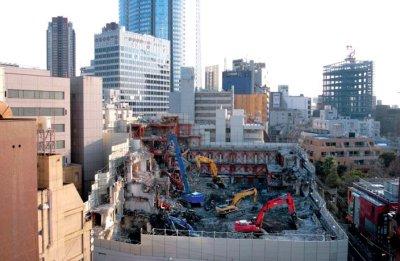The Gangster’s Castle
The bizarre case of yakuza, property rights and fraud—scrabbling to make a fortune in Roppongi real estate
By Brett Bull
Given Tokyo’s well-earned reputation as a metropolis of concrete, vacant lots typically do not stay empty for long. But the 3,800-square-meter site halfway between Roppongi Hills and Tokyo Midtown might remain fenced off and covered with dirt for some time.
The infamous TSK • CCC Terminal building formerly occupied the property until its demolition was completed in April—just one chapter in a bizarre case involving gangsters, property rights, and fraud whose roots can be traced back to Korean mobster Hisayuki Machii ( “the Ginza Tiger”), who made his fortune in real estate and operated a ferry service between Japan and South Korea.
Machii headed the company Toa Sogo Kigyo (TSK), a front for the Tosei-kai yakuza gang, and opened the “Celebrity Choice Club” in 1973. The then lavish complex, which rose seven floors above ground and three below, boasted night clubs, a beauty salon, a spa, the headquarters of Toa Sogo Kigyo and a rooftop garden and a tennis court—all just seconds from the bustling Roppongi crossing. A gala opening that summer featured appearances by entertainers, politicians, and sports stars, such as Yomiuri Giants legend Shigeo Nagashima.
The trusted associate of the Korean-born Machii was Yoshio Kodama, the notorious political fixer. The boxy, maze-like TSK building was their Camelot.
Upon Machii’s death in September 2002, ownership of the structure, which had fallen into a state of disrepair, became unclear. Creditors, who over the decades had found getting payments from mobsters highly challenging, seized the majority of the building. Complicating matters were building registration irregularities and multiple parties claiming ownership to other various bits of the structure. Another gang group wound up squatting on the premises.
For years establishments operated in some areas while others remained chained shut. Most recently TSK housed the club Vanilla, the bar Tokyo Sports Cafe, and the hostess club Private Eyes. Roppongi denizens probably will recall its gaudy, Porsche inspired shield emblem that hung outside.
 The 3,800 square-meter site, with Roppongi Hills in the background, is at the center
The 3,800 square-meter site, with Roppongi Hills in the background, is at the center
The arrest last year of former intelligence chief Shigetake Ogata brought the situation into the public’s view. He is presently on trial for conspiring to defraud Chongryon (pro-Pyongyang General Association of Korean Residents in Japan) out of ¥484 million while simultaneously attempting to purchase two condominium units within TSK.
With land prices in central Tokyo having risen substantially in recent years, the TSK plot has been seen as highly valuable. In July 2006, a real estate company known as Toshi Urban Kaihatsu purchased the majority of the building for ¥25.2 billion at auction from the creditors. By August of last year, the company had bought up the remaining pieces of TSK. Demolition started soon after.
A television documentary last year reported Toshi Urban Kaihatsu as being a Chiyoda Ward-based limited-liability company capitalized at ¥3 million, operating out of a one-room apartment, and receiving its funding offshore. Given these facts, the documentary implied that the company was a rather questionable candidate to be raising such large sums of money.
What will happen next is unclear. Toshi Urban Kaihatsu might like to resell the property as soon as possible to make a profit but observers are not sanguine about such a scenario transpiring.
Yuzuru Goto, administrative director of the Roppongi Shopkeepers Association, hopes that a big developer like Sumitomo or Mitsui will purchase the land, but he believes that they will stay on the sidelines. “The rumor that yakuza money still ‘sleeps’ inside TSK will keep everyone away,” he says. “They know that the price will mysteriously rise once the negotiations start.”
Indeed, the tiger still roars from the grave. JI





